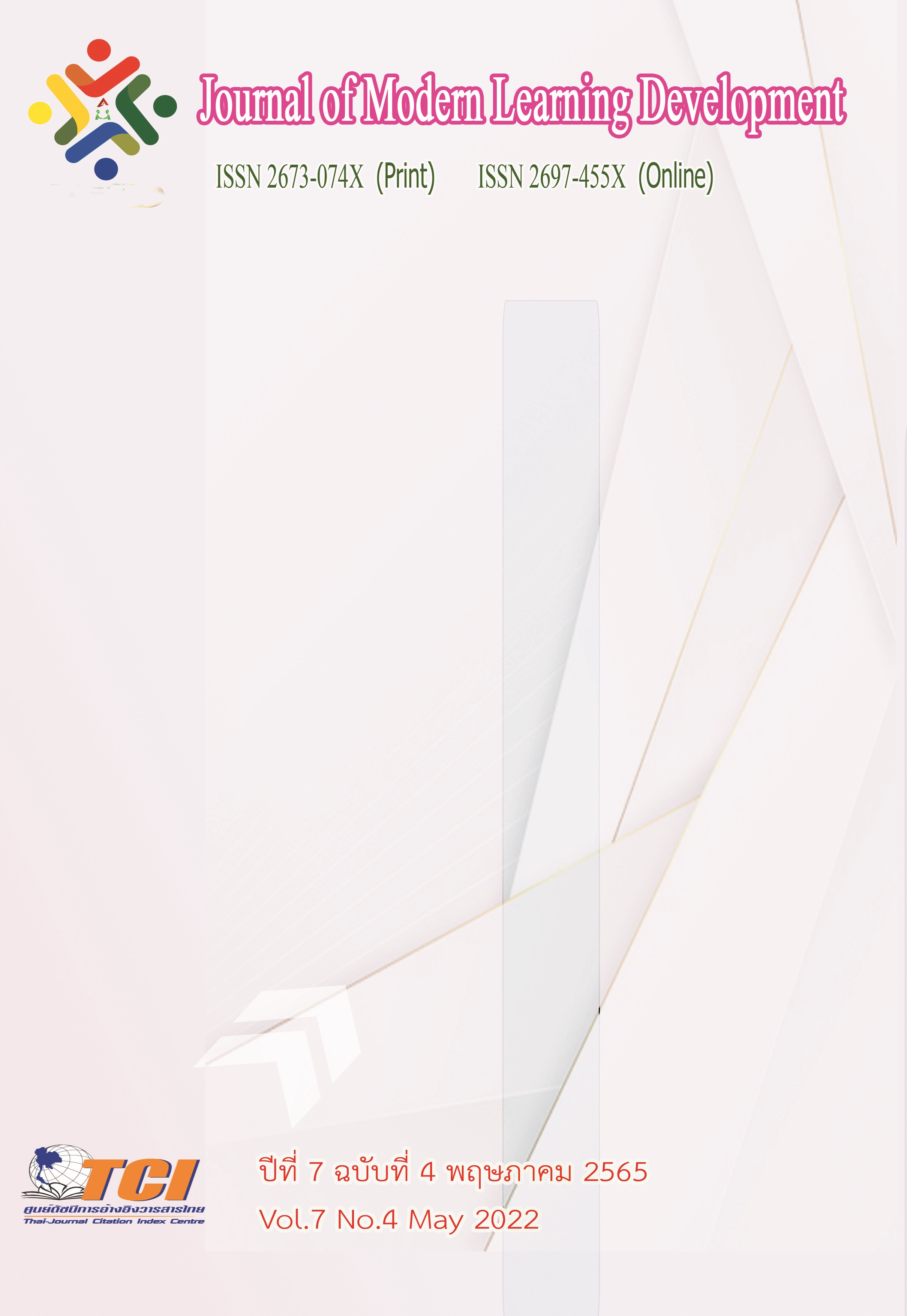ผลของโปรแกรมฝึกอบรมโดยใช้พฤติกรรมตัวแบบที่มีต่อภาวะผู้นำการเปลี่ยนแปลงของนิสิตผู้นำนันทนาการ
Main Article Content
บทคัดย่อ
การวิจัยกึ่งทดลองครั้งนี้ มีวัตถุประสงค์เพื่อศึกษาผลของโปรแกรมฝึกอบรมโดยใช้พฤติกรรมตัวแบบที่มีต่อภาวะผู้นำการเปลี่ยนแปลงของนิสิตผู้นำนันทนาการ กลุ่มตัวอย่างคือ นิสิตผู้นำนันทนาการ ชั้นปีที่ 2 และชั้นปีที่ 3 คณะพลศึกษา มหาวิทยาลัยศรีนครินทรวิโรฒ จำนวน 60 คน นำมาทำการสุ่มแบบแบบหลายขั้นตอน (Multi – Stage sampling) เพื่อคัดเข้ากลุ่มทดลองและกลุ่มควบคุม กลุ่มละ 30 คน เครื่องมือที่ใช้ในการวิจัยประกอบด้วย 1) โปรแกรมฝึกอบรมโดยใช้พฤติกรรมตัวแบบที่มีต่อภาวะผู้นำการเปลี่ยนแปลงของนิสิตผู้นำนันทนาการ 2) แบบวัดภาวะผู้นำการเปลี่ยนแปลงของนิสิตผู้นำนันทนาการ ผ่านการตรวจคุณภาพเครื่องมือโดยผู้เชี่ยวชาญ จำนวน 5 ท่าน สถิตที่ใช้ในการวิเคราะห์ข้อมูล ได้แก่ ค่าความถี่ ร้อยละ ค่าเฉลี่ย ส่วนเบี่ยงเบนมาตรฐาน และการทดสอบค่าความแตกต่าง t-test 2 ประเภท คือ Pairs t-test ใช้ทดสอบความแตกต่างของกลุ่มตัวอย่างก่อนและหลังเข้าร่วมโปรแกรมฝึกอบรมโดยใช้พฤติกรรมตัวแบบ และใช้ Independent Sample t-test ทดสอบความแตกต่างระหว่างกลุ่มทดลองและกลุ่มควบคุมก่อน – หลังเข้าร่วมโปรแกรมฝึกอบรมโดยใช้พฤติกรรมตัวแบบ
ผลการวิจัยพบว่า 1) ภายหลังการทดลอง กลุ่มทดลองมีการเปลี่ยนแปลงทั้งรายด้านและภาพรวมสูงกว่าก่อนการทดลองอย่างมีนัยสำคัญทางสถิติที่ระดับ 0.05 2) ภายหลังการทดลอง กลุ่มทดลองมีการเปลี่ยนแปลงทั้งรายด้านและภาพรวมสูงกว่ากลุ่มควบคุมอย่างมีนัยสำคัญทางสถิติที่ระดับ 0.05
Article Details
เอกสารอ้างอิง
กรมพลศึกษา. (2562). แนวทางการบริหารจัดการศูนย์นันทนาการ (Recreation Center). กรุงเทพมหานคร: โรงพิมพ์เอส.ออฟเซ็ทกราฟฟิคดีไซน์.
มหาวิทยาลัยศรีนครินทรวิโรฒ. (2562). จำนวนนิสิตจำแนกตามระดับการศึกษา ประจำปีการศึกษา 2562. สืบค้นเมื่อ 3 ธันวาคม 2563. แหล่งที่มา: http://edservices.op.swu.ac.th/LinkClick.aspx? fileticket=mTvi84JkAvU%3d&tabid=7689&portalid=26&mid=18843.
ฉลอง คุณประทุม. (2555). การพัฒนาภาวะผู้นำการเปลี่ยนแปลงของนักศึกษา โรงเรียนวัฒนพฤกษาบริหารธุรกิจ. วารสารบริหารการศึกษา มศว. 9 (16), 83 – 92.
บุญเรียง ขจรศิลป์. (2549). สถิติวิจัย 1. (พิมพ์ครั้งที่ 9). กรุงเทพมหานคร: ภาควิชาการศึกษา คณะศึกษาศาสตร์มหาวิทยาลัยเกษตรศาสตร์.
สมนึก แก้ววิไล. (2560). นันทนาการเพื่อการฝึกอบรม : หลักการและการปฏิบัติ. กรุงเทพมหานคร: สำนักพิมพ์แห่งจุฬาลงกรณ์มหาวิทยาลัย.
วุฒิพงษ์ ทองก้อน. (2554). การพัฒนาหลักสูตรฝึกอบรมเพื่อเสริมสร้างความรู้และทักษะการประกันคุณภาพสำหรับนักศึกษาระดับปริญญาตรี. ดุษฎีนิพนธ์ กศ.ด. (หลักสูตรและการสอน). บัณฑิตวิทยาลัย: มหาวิทยาลัยบูรพา.
สุดารัตน์ พิมลรัตนกานต์, เฉลิมชัย กิตติศักดิ์นาวิน, และนลินณัฐ ดีสวัสดิ์. (2560). ปัจจัยด้านภาวะผู้นำการเปลี่ยนแปลงที่มีผลต่อการพัฒนาองค์การ. วารสารวิชาการ สาขามนุษยศาสตร์ สังคมศาสตร์ และศิลปะ. 10 (1), 1643 – 1660.
สุภัชฌาน์ ศรีเอี่ยม. (2555). อัตลักษณ์นิสิตนักศึกษาในสถาบันอุดมศึกษา. วารสารวิชาการมหาวิทยาลัยอีสเทิร์นเอเชีย สังคมศาสตร์และมนุษยศาสตร์. 2 (2), 186 – 199.
สัมฤทธิ์ แสงทอง, โยธิน ศรโสภา, จิตติรัตน์ แสงเลิศอุทัย, & วรวุฒิ จิรสุจริตธรรม. (2558). การพัฒนาหลักสูตรฝึกอบรมภาวะผู้นำสำหรับผู้บริหารระดับต้นในสถานศึกษา สังกัดมูลนิธิคณะซาเลเซียนแห่งประเทศไทย. วารสารวิจัยสหวิทยาการไทย. 10 (2), 37 – 43.
อนันทิยา พุ่มเพ็ชร. (2558). ผลของการโปรแกรมการพัฒนาภาวะผู้นำการเปลี่ยนแปลงของหัวหน้าหอผู้ป่วยต่อผลการปฏิบัติงานของพยาบาลวิชาชีพในโรงพยาบาลเฉพาะทางแห่งหนึ่ง สังกัดกรมการแพทย์กระทรวงสาธารณะสุข. วิทยานิพนธ์ พย.ม. (การบริหารการพยาบาล). บัณฑิตวิทยาลัย: มหาวิทยาลัยคริสเตียน.
อรุณรุ่ง เอื้ออารีสุขสกุล และธีระวัฒน์ จันทึก. (2559). ภาวะผู้นำการเปลี่ยนแปลง : เปลี่ยนความท้าทายมุ่งสู่ความสำเร็จขององค์การอย่างยั่งยืน. วารสาร Veridian E Journal, Silpakorn University สาขามนุษยศาสตร์ สังคมศาสตร์ และศิลปะ. 9 (1), 845 – 860.
อรพินทร์ ชูชม. (2552). การวิจัยกึ่งทดลอง. วารสารพฤติกรรมศาสตร์. 15 (1), 1 – 15.
Bass, B. M., & Avolio, B. J. (1994). Improving Organizational Effectiveness Through Transformational Leadership. Sage Publications, Inc.
Cherniss, C., & Goleman, D. (2001). The Emotionally Intelligent Workplace. San Francisco, CA: Jossey-Bass
Festinger, L. (1957). A theory of cognitive dissonance A theory of cognitive dissonance. Stanford University Press.
Iyer, R. (2018). Behaviour modeling training as a training methodology. Somaiya Institute of Management Mumbai, India. 1 – 12.
Mayer, S. J., & Russell, J. S. (1987). Behavior Modeling Training in Organizations: Concerns and Conclusions. Journal of Management. 13(1): 21-40.
Shibru, B. (2011). Effects of transformational leadership on subordinate job satisfaction in leather companies in Ethiopia. Int.J.Buss.Mgt.Eco.Res. 2(5): 334-344
Taylor, P. J., Russ-Eft, D. F., & Chan, D. W. L. (2005). A Meta-Analytic Review of Behavior Modeling Training. Journal of Applied Psychology. 90(4): 692–709.


